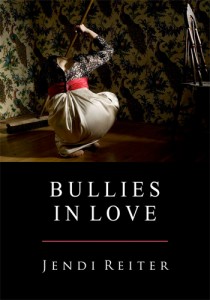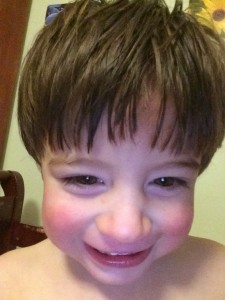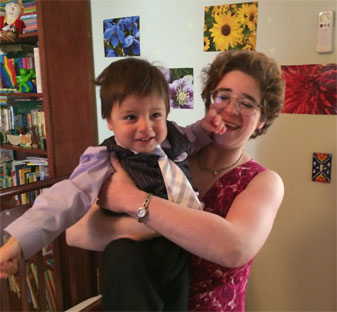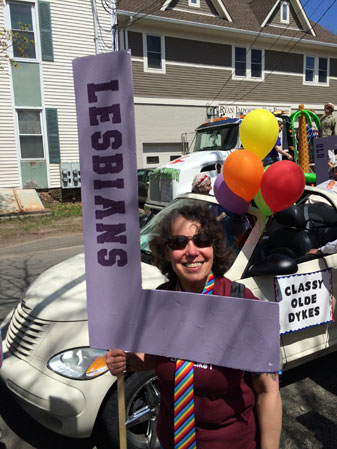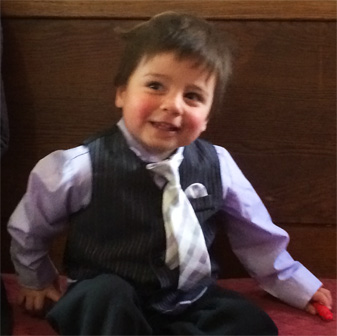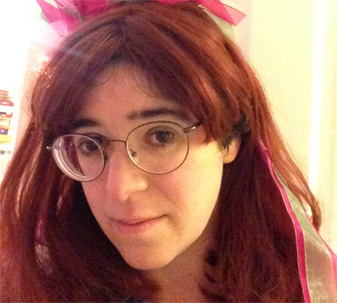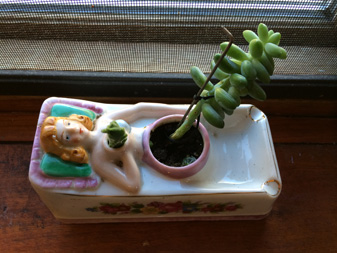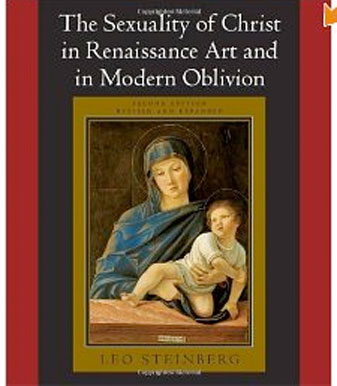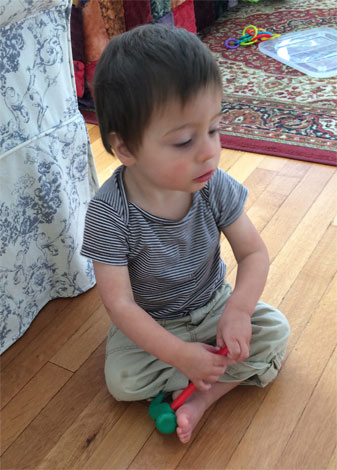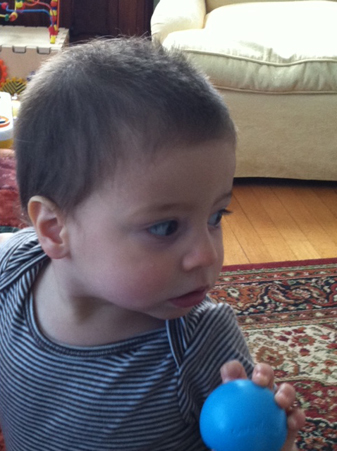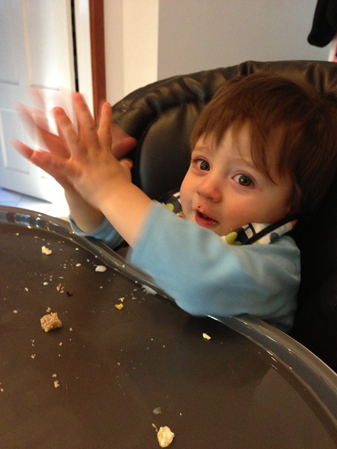As I wait this week for “Santa” to deliver another load of toys for my little man, I’m pondering the devaluation of femininity that stubbornly persists in the two realms where I spend much of my time: parenting and gay male fiction.
Over his short lifetime, the Young Master has already been gifted with a set of golf clubs, two baseball bats, two footballs, three soccer balls, and a set of footie PJs absurdly captioned “Tough Guy”. Only Mommy defied convention and bought him a Barbie, whose favorite activities seem to be dancing and farting. Meanwhile, the toy catalogs crowding my mailbox proclaim, “Gifts for your little princess and action hero!” Inside, I might see photos of both boys and girls playing with sports equipment, science kits, and wheeled vehicles, but the mini kitchens and vacuum cleaners are pink-trimmed and only advertised with girls in the pictures.
Some progressive parenting organizations talk about this problem, but their strategies focus more on including girls in “boy” activities than removing the stigma of girliness. The Center for Commercial-Free Childhood, for instance, does good work keeping advertising out of educational environments, but their “worst toys of the year” list almost always includes my old friend Barbie, because she supposedly makes girls ashamed of their bodies. No, patriarchy does that; pretty women (real or imaginary) are just being who they have a right to be.
I recently rediscovered this 2013 post from Christian feminist and fiction writer A.M. Leibowitz’s Unchained Faith blog, “The Meaning of Pinkhood“:
The Big Questions that always come up are: Why can’t they market toy stoves and tea sets in neutral colors? Why can’t doll clothes come in blue as well as pink? Why can’t I find a boy doll? Why can’t Barbies utter oddly specific action phrases when you push a button on their backs? Why must all Legos be placed in the boys’ section?
Meanwhile, I’m asking an entirely different set of questions.
Why can’t boys own a full set of My Little Pony figurines? Why doesn’t Batman say, “Give me a hug!” when you press a button? Why isn’t it okay for a boy to be featured on the toy stove box, even if it is pink?
We’ve gotten very comfortable asking why the girls’ aisle is hosed in pink and frills while the boys get action and adventure. We intentionally choose to shop for our daughters among the Legos and Monster Trucks and superheroes. We’re okay with urging our daughters to try out sports and climb trees and wear any damn thing they want to…
…It seems to me that the reason for this is that we like the erasure of cultural femininity more than we like the erasure of cultural masculinity.
Cultural femininity is seen as weak and bad. How many of us have gone from feeling stifled by the lack of options to feeling guilty that we still want some (or most) of those feminine things? How many men feel like they are less, somehow, because they have traits usually associated with women?
It took me a long time to accept that I like the color pink and that I like stories with a little romance. I sort of felt like I couldn’t even enjoy a Disney princess movie without having to examine its problematic elements first. This erasure of anything culturally feminine means that in order to survive, I must become more like a man. But if I become more like a man, not only do I destroy that which is considered feminine in myself, I also end up being told that I actually want to be a man! Or I’m a bitch or a ball-buster or some other negative term for a woman who isn’t “woman” enough. Yet if I give up and go home, then my femininity makes me invisible again. We often don’t have the option of being both culturally feminine and strong…
Go read the whole post. It’s a keeper.
This leads into my other gripe, the misogyny problem in fiction about gay male love. As Gail Dines says in her feminist critique of porn, under patriarchy women are categorized as either “fuckable” or “invisible”. Since, by definition, M/M is about men preferring men to women, the female characters are not “fuckable” in any way that matters to the hypothetical reader. (Because there are no bisexuals out there, right?) I’ve read some novels in this genre with no female characters at all, and some where the women are grotesque caricatures–pathetic fag-hags, smothering moms, ballbusting exes. Neither of these scenarios reflect the real world, where men of all orientations are embedded in a community of female friends, colleagues, and relatives. Ken Murphy’s Sharing Heart is a pleasant exception.
By contrast, Tim Bairstow, whose first novel The Shadow of Your Wings was a gorgeous bittersweet tale of gay Christian self-acceptance, cruelly betrayed his female readers with What Do You Want for Christmas?, where he misses no opportunity to mock the loathsome plus-size body of the hero’s clueless girlfriend. Their sex scene is fat-shaming horror reminiscent of Beowulf in the clutches of Grendel’s Dam.
I think some gay male writers are projecting their shame onto their female characters. They are passing on the legacy of whoever bullied them for being a “sissy”. If you’ve ever watched the old Showtime series “Queer As Folk“, did you notice how the unlikeable gay male characters were portrayed as effeminate weenies, while the protagonists were hyper-masculine studs? Sexism and homophobia are variations on the same awful theme. Women’s love for M/M fiction has the potential to build alliances against oppression, which makes it all the more hurtful when the gender wars resurface there.
Googling “M/M misogyny”, I came across this insightful post by Damon Suede, a gay man who writes romance: “Worse than a girl, better than a woman“.
…Not to say that gay romance is inherently misogynistic, but rather that it seems that much of gay romance writing expresses a deep mistrust and offers harsh criticism of traditional female roles. The girls that heroes are “worse than” seem more like the stereotype of girlhood, and the women that these “better” male/male couplings supplant are the traditional ideas and roles with which women are saddled.
Fans of the genre often remark on their impatience with female characterization in traditional romance fiction… joking that “two hot men are better than one.” But the role of female characters in gay romance remains a bit of a briar patch. Often female characters are not only subordinate in gay romance fiction, they are downright marginalized, lobotomized, or demonized because they serve in roles.
On one hand, it makes sense that in focusing on men who love each other and have sex with each other, that ways of introducing drama and conflict would often rely on the familiar soap-opera tropes of divorce, infidelity, family rejection, single parenting. Many of these situations involve women by default.
It stands to reason: if you want to introduce an infant character, who is the mother? If your hero is divorcing someone, who was she? If his parents appear, who did the childbearing? The core relationship in gay romance fiction is between those two (or more) fellas. By necessity, women in these stories tend to slide into the ruts of sympathetic friend or castrating bitch. Over and over in gay romance we see shrieking harpies angry at their betrayal by “the degenerate faggot(s)” in their life and kooky, supportive gal-pals who want to watch television while they snuggle sexlessly on the couch with their hot-but-unavailable BFF.
Totally logical, if the female character is nice she supports that manlovin’ and cannot and would not intrude with her own sexuality. If she’s not nice, intrusion is the order of the day, complete with near-rapes and/or tantrums and/or recrimination because the evil female always wants to wreck the protagonist and anyone else caught in the self-righteous heterosexist crossfire.
It’s hardly surprising. The sexual charge in gay romance is by definition situated between the male protagonists, so the women at their margins run the risk of disrupting the dynamic at the genre’s core. What’s the simplest solution for an unsteady author?: female characters must be defused, desexed, or dismissed… either as unattractive castrators or as loving-but-nonthreatening bystanders.
Damon, you’ve persuaded me to buy one of your novels on my Kindle. Then I’m going to write an alternate ending to Bairstow’s What Do You Want… where poor “Sally” has a telekinetic meltdown à la Carrie and drowns all the wankers in her vaginal blood.
Merry Christmas, bitches!
